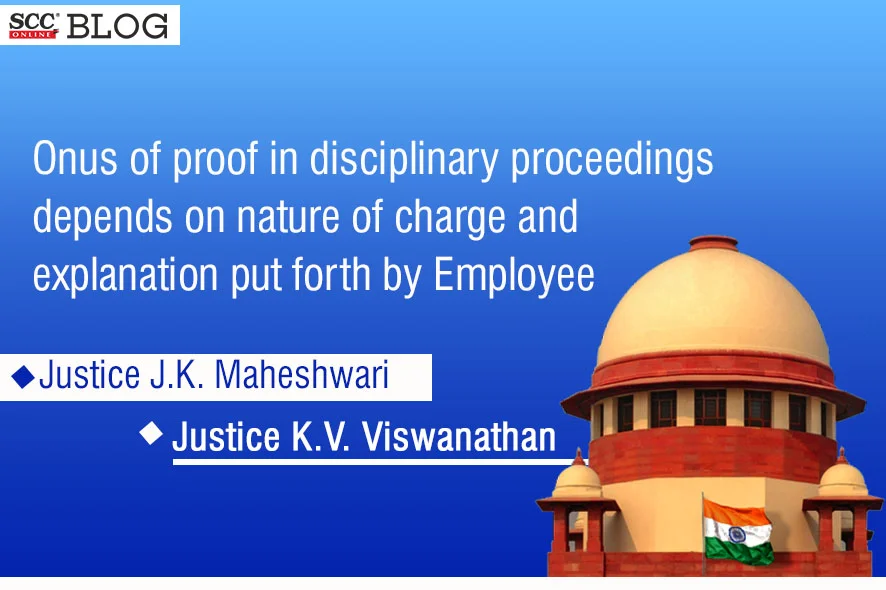Supreme Court: In a civil appeal filed by the State Bank of India (‘SBI’) against the Judgment of Karnataka High Court, whereby SBI’s appeal was dismissed and confirmed the Single Judge’s order, allowing the respondent’s petition and quashed the Appointing Authority’s decision imposing a punishment of reduction of the salary of the respondent, the Division Bench of J.K. Maheshwari and K.V. Viswanathan*, JJ. allowed the appeal and set aside the impugned judgment of the Single Judge and Division Bench.
Background
In the matter at hand, disciplinary proceedings were initiated against the respondent for certain acts of misconduct including not conducting periodical inspections and non-completion of formalities for creating equitable mortgage over immovable property offered as collateral security as per the instructions when he was working as Field Officer. The Disciplinary Authority found the appellant guilty on the basis of the enquiry officer’s report. Subsequently, the Appointing Authority passed an order imposing a penalty of ‘reduction in basic pay to the lowest stage in Scale-I’ as provided under Rule No. 49(e) of the State Bank of India (Supervising Staff) Service Rules and further to treat the period under suspension from 18-08-1990 till the order of his reinstatement as suspension only.
Decision
Regarding the charge for non-submission of control forms, the Court found that the Single Judge was right in his recording that the when the respondent denied the charge, the onus was on the Disciplinary Authority to prove the charge alleged against the respondent by producing relevant material and the material must be such that it amounts to proving the guilt of the respondent in respect of the charge against him with some degree of definiteness. Regarding the charge of non-conduct of periodical inspections, the Court said the High Court erred in its findings.
For onus of proof, the Court reiterated that it is well settled that, in a disciplinary proceeding, the question of burden of proof would depend upon the nature of the charge and the nature of the explanation put forward by the respondent. The Court also said that the burden may be shifted to the respondent depending upon the explanation. In the present case, the Court noted that the witnesses were examined, and the Enquiry Officer had specifically asked the defence representative to mention the inspection registers in respect of the units which were required to be inspected. The Court also noted that the Presenting Officer produced the inspection register for the relevant period for perusal of the Enquiry Officer and the defence representative. The Court said that the said submission was not impressive as it was after the production of the inspection register that the defence representative of the respondent had stated, that they will respond after going through the said documents, however, there was no forthcoming response. The Court said that as the records sought by the respondent were made available, the onus shifted to the respondent to show that the charge was untenable.
Further, the Court said that the finding of the Enquiry Officer that the respondent, by his negligence, did not stipulate anything regarding taking of collateral security in his recommendation to the Branch Manager and, as such, the advance could not be collaterally secured by creation of equitable mortgage cannot be said to be perverse or based on no evidence. The Court held that on non-submission of control form, the transgression of the area of operation and non-declaration of the immovable property and certain other charges, the order of penalty can be sustained.
On Scope of judicial review in disciplinary proceedings, the Court said that the scope of judicial review against a departmental enquiry proceeding is very limited. The Court explained that the scope of the enquiry is to examine whether the decision-making process is legitimate and to ensure that the findings are not bereft of any evidence. If the records reveal that the findings are based on some evidence, it is not the function of the Court in a judicial review to re-appreciate the same and arrive at an independent finding on the evidence.
The Court held that it cannot be said that the report was based on no evidence or that it was perverse. The Court said that the Single Judge had transgressed the limits of judicial review in setting aside the enquiry proceedings and the punishment imposed. The Court found the Division Bench to be non-sustainable for confirming the Single Judge’s judgment.
Therefore, the Court allowed the appeal and set aside the impugned orders of the Single Judge and Division Bench. Thus, the Court maintained the penalty as imposed in the order of the Appointing Authority.
[SBI v. A.G.D. Reddy, 2023 SCC OnLine SC 1064, Decided on 24-08-2023]
*Judgment Authored by: Justice K.V. Viswanathan
Know Thy Newly Appointed Supreme Court Judge: Justice K.V. Viswanathan
*Deeksha Dabas, Editorial Assistant has reported this brief.






